Top 10 DevOps Tools & Platforms To Look For In 2024
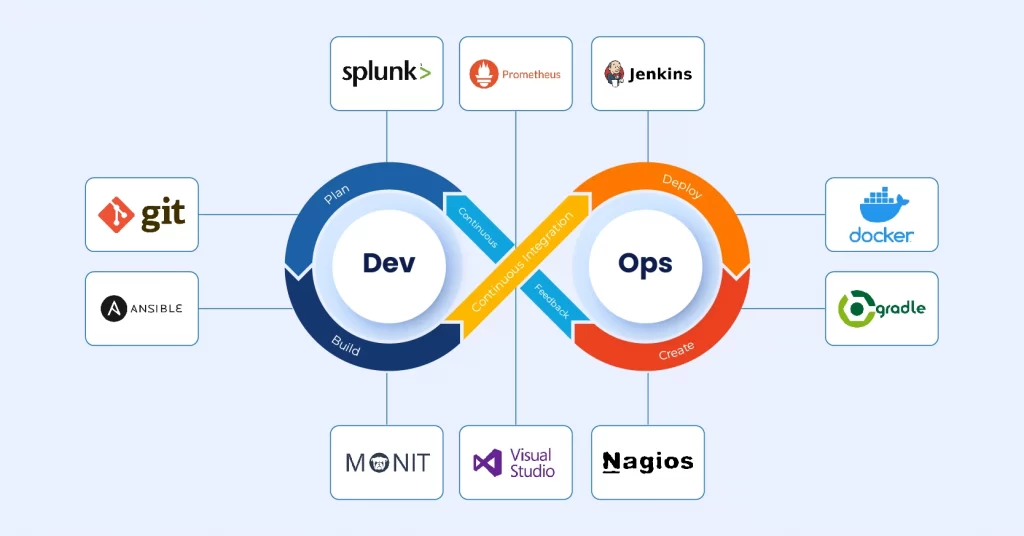
In the dynamic landscape of software development, the harmony between efficiency and quality is of utmost importance. Slow and glitch-ridden applications can cripple productivity and sour user experiences. Yet, finding a remedy for such bottlenecks can be an elusive quest. This is where the beacon of DevOps shines brightest.
DevOps, a convergence of development and operations, serves as the nexus for scaling and expediting product delivery. This powerful approach leverages the prowess of the best DevOps tools and platforms to implement practices that fuel automation, infrastructure as code, continuous integration, and seamless testing, culminating in remarkable outcomes.
Table of Contents
The Evolution Of DevOps: From Waterfall To Seamless Integration
The mission of DevOps? Simple: To mechanize every phase of the development lifecycle. The prize? Frequent releases, amplified scalability, and the advent of CI/CD (Continuous Integration/Continuous Delivery). The merits of intertwining development and operations teams eclipse any drawbacks, igniting a transformation that redefines software creation.
However, cherry-picking the optimal tools to enact DevOps in your ensemble can be akin to navigating a labyrinth. It’s in this pursuit that we look upon the best DevOps tools that illuminate the path to superior agility and efficiency in your development endeavors.
As we delve into these tools, categorized for your convenience, you will discover the catalysts that can reshape your approach. From deployment to continuous integration, monitoring to security, and cost management to automation, these tools pave the way toward a future where DevOps excellence is the new norm. With that in mind, let’s get started.
What Are DevOps Tools?
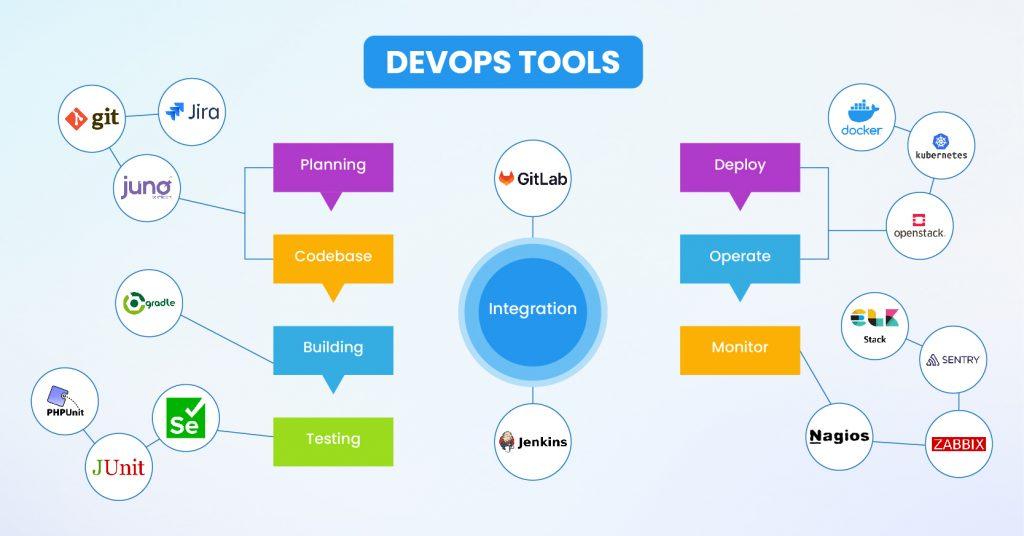
DevOps tools are a set of software solutions and technologies designed to facilitate and automate various stages of the software development lifecycle (SDLC) and the operations process. These tools aim to improve collaboration, communication, efficiency, and productivity among development, operations, and quality assurance teams.
At their core, DevOps tools serve as the architect’s blueprint for building a streamlined and iterative pipeline. They encompass an array of functionalities, from automating routine tasks to facilitating the continuous delivery of code. These tools imbue the development process with unprecedented agility, laying the groundwork for rapid iterations and consistent releases.
Furthermore, DevOps tools transcend the boundaries of individual tasks, taking into account monitoring, security, and cost management within their purview. This holistic approach ensures that not only the creation but also the sustainability & robustness of software systems are upheld.
Forging DevOps Harmony: Crafting Excellence Through Tool Integration
The selection of the right DevOps tools can be likened to assembling the perfect ensemble for a symphony. Nevertheless, each tool plays a unique role, thereby harmonizing with others to create a melodious composition of overall efficiency and innovation.
As we look into the best DevOps tools in the upcoming section, we will unravel their diverse functionalities and delve into the artistry of their integration. Through this exploration, a vivid tapestry of DevOps excellence will emerge, spotlighting the tools that shape our digital future.
How Can DevOps Tools Benefit Your Business?
In today’s modern software alchemy, DevOps tools emerge as the enchanting catalysts for business metamorphosis. These digital marvels extend their transformative touch beyond mere code compilation, fundamentally reshaping the DNA of operational efficiency.
DevOps tools usher in an era of streamlined collaboration, where development and operations come in sync. Automation takes center stage, waltzing through the repetitive tasks that once bogged down progress. This symphony of automation orchestrates tasks like testing, deployment, and monitoring, liberating skilled minds to focus on innovation.
Cultivating Organizational Transformation Through DevOps Tools
The benefits ripple across the organizational pond. Efficiency amplifies, courtesy of swift feedback loops. Time-to-market shrinks, leaving competitors trailing in the wake of rapid releases. Quality ascends, as meticulous testing becomes woven into the development fabric.
Furthermore, DevOps tools translate into bottom-line boons. Operational costs slim down as automation trims excess fat. Downtime diminishes, safeguarding customer experiences. Teams synchronize, fostering a culture of collaboration and shared goals.
Top 10 DevOps Tools & Platforms For 2024
Want to explore the top 10 Platforms tools for 2024 to elevate your software endeavors? Some of the best DevOps tools are Kubernetes, Nagios, Docker, Katalon, Ranorex Studio, Jenkins, etc. Let’s start the exploration.
1. Kubernetes
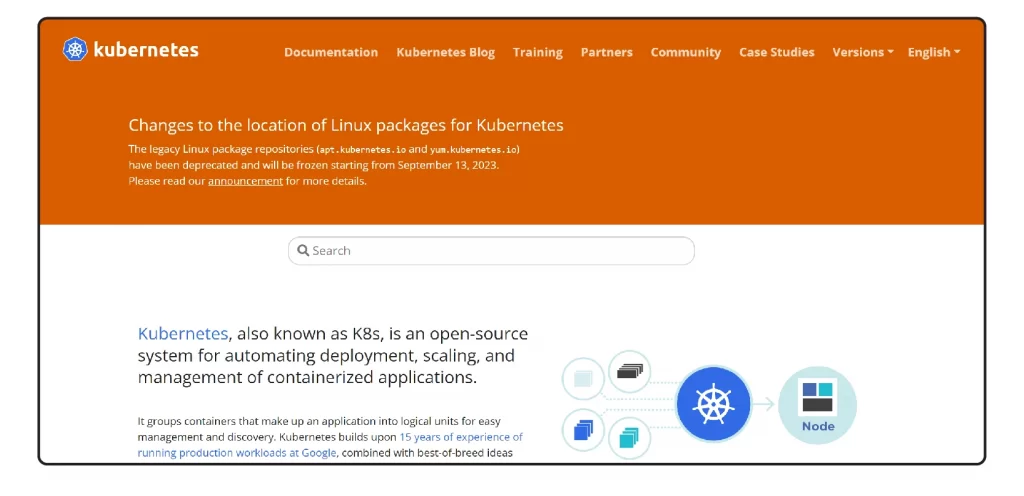
Kubernetes emerged from the minds of Google engineers, taking container management to the next level. It excels in organizing containers into logical units, making it an essential choice when managing a multitude of containers. Kubernetes liberates applications from single-machine constraints, enabling deployment across various PCs with automated distribution and scheduling.
Within a Kubernetes cluster, a master node enforces predefined rules, efficiently orchestrating containers across worker nodes. This vigilant system continuously monitors and adapts, ensuring smooth operations, even in challenging conditions. It’s the go-to solution for DevOps teams seeking automation, scalability, and efficiency.
Key Features Of Kubernetes:
- Versatility: Kubernetes isn’t confined to a single environment; it thrives on flexibility, seamlessly accommodating on-premise, cloud, or hybrid setups.
- Automation Mastery: Automated rollouts, effortless scaling, and efficient rollbacks ensure that your operations run with precision and agility.
- Integration Ingenuity: Kubernetes plays well with others, integrating effortlessly with fellow DevOps tools like GitLab to enhance your workflow.
- Service Excellence: It’s not just about containers; Kubernetes boasts service discovery, load balancing, and storage orchestration to keep your applications performing at their peak.
- Charting the Course: Utilize helm charts to embark on deployments with customized applications, navigating your software projects with precision.
- Community Strength: With a vast and supportive community, Kubernetes is backed by a wealth of knowledge and experience, ensuring you’re never alone on your DevOps journey.
2. Nagios
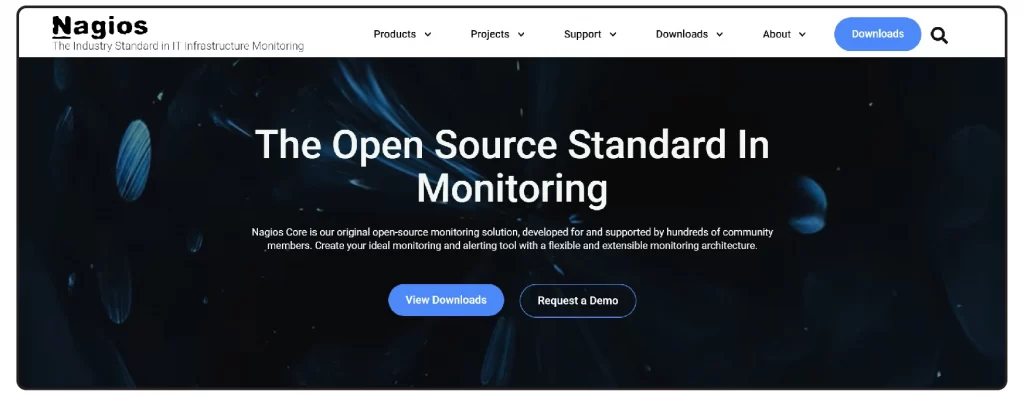
Nagios, among the most renowned free and open-source DevOps monitoring tools, excels in infrastructure monitoring, issue resolution, and reporting. With Nagios, you gain insights through graphs and reports, allowing you to anticipate outages, forecast errors, and identify security threats. Its unique strength lies in the vast ecosystem of plugins, adding layers of versatility.
Nagios offers four distinct monitoring solutions:
Nagios Core: A command line tool for foundational monitoring.
Nagios Log Server: Empowers log data search and threat alert setup.
Nagios XI: Equipped with a user-friendly web-based GUI and monitoring wizard.
Nagios Fusion: Monitors multiple networks concurrently, simplifying the management of expansive infrastructures.
Key Features Of Nagios
- Open Source Advantage: Nagios is open source, translating to cost-effectiveness and accessibility for all.
- Infrastructure Empowerment: It facilitates infrastructure upgrades and maintenance scheduling to ensure your systems operate at their best.
- Comprehensive Network Monitoring: Nagios excels in monitoring, assessing, and identifying critical network infrastructure elements, promoting proactive issue resolution.
- Automated Solutions: Many issues are resolved automatically, alleviating the burden on your teams and minimizing downtime.
- Effortless Log Searching: Nagios simplifies log searching, enabling efficient troubleshooting and issue identification.
- Bandwidth Optimization: Keep a keen eye on available bandwidth and network traffic to optimize usage effectively.
3. Docker
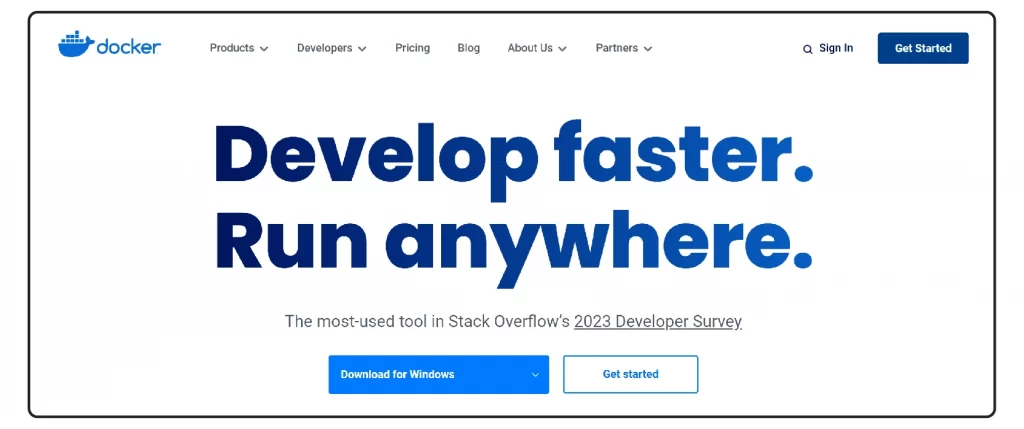
Docker, a transformative DevOps tool, paves the way for streamlined application creation, management, and deployment through the ingenious use of containers. At its heart, Docker container images emerge as portable, standalone packages, empowering DevOps teams to achieve unparalleled agility and efficiency in their workflows.
Docker’s lightweight nature helps in a great way to accelerate various processes, expediting the development-to-deployment journey. With Docker, DevOps teams can effortlessly construct, ship, and govern distributed applications hosted within containers. Its seamless integration with popular CI/CD tools amplifies its capabilities, enabling smoother pipelines.
Key Features Of Docker:
- Rapid Deployment: Docker accelerates deployment through its lightweight containers, minimizing setup times.
- Integration Excellence: Docker seamlessly integrates with CI/CD tools like Jenkins and Bamboo, streamlining the development pipeline.
- Consistent Environments: Docker provides a consistent and isolated environment, ensuring applications run reliably across diverse settings.
- Cost-Effective Operations: The rapid deployment, trial run, and rollback capabilities of Docker contribute to cost-effective operations.
- Multi-Environment Support: Docker packages applications to run consistently in various environments, ensuring compatibility and flexibility.
- Private Registries: Docker’s private registry support, complete with cache configuration, simplifies image management and distribution.
4. Katalon
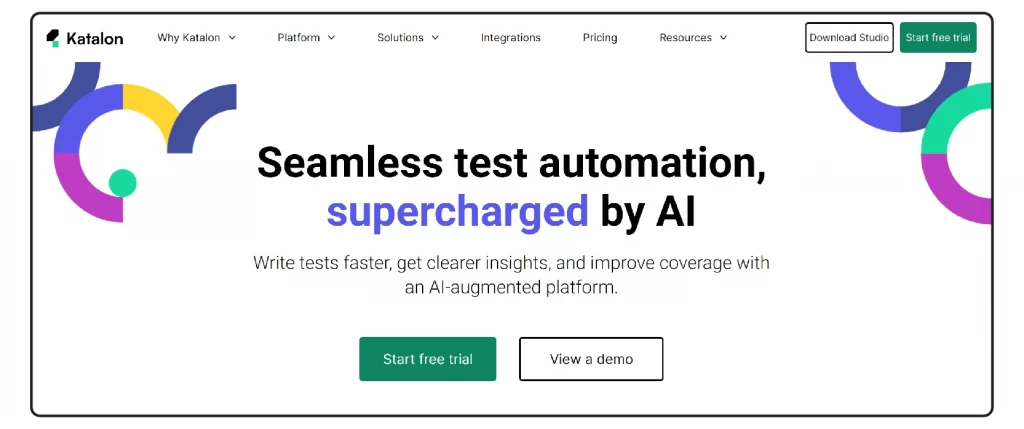
Katalon emerges as a game-changer in the field of test automation. This versatile tool is a low-code, all-in-one solution tailored for testing web, API, mobile, and Windows desktop apps. It steps in as an efficient alternative to self-built frameworks, significantly reducing the time and effort involved in creating, executing, maintaining, and reporting on automated tests.
Katalon’s flexibility shines through its deployment capabilities, making it a prime choice for implementing continuous testing across diverse DevOps tools for infrastructures. Nevertheless, it seamlessly operates on various OS, browsers, and devices, whether the Software Under Test (SUT) resides in the cloud, on-premises, or in a hybrid environment.
Key Features Of Katalon:
- Multi-Faceted Testing: Katalon covers an extensive range of testing needs, from web and API to mobile and Windows desktop applications.
- Time Efficiency: It drastically reduces the time spent on test automation, thereby accelerating your testing lifecycle.
- Cross-Platform Support: Katalon flexibly operates across different operating systems, browsers, and devices, ensuring comprehensive test coverage.
- Fluent Assertions: AssertJ support empowers users to create fluent assertions in a BDD (Behavior-Driven Development) style.
- Robust Reporting: Katalon offers a variety of reporting formats, including HTML, PDF, CSV, and JUnit, along with Report History to track results over time.
- Easy Integration: Seamlessly integrate Katalon with Jira Agile and popular CI tools like Jenkins, Bamboo, Azure, and CircleCI, making it a vital tool in the DevOps toolkit.
5. Ranorex Studio
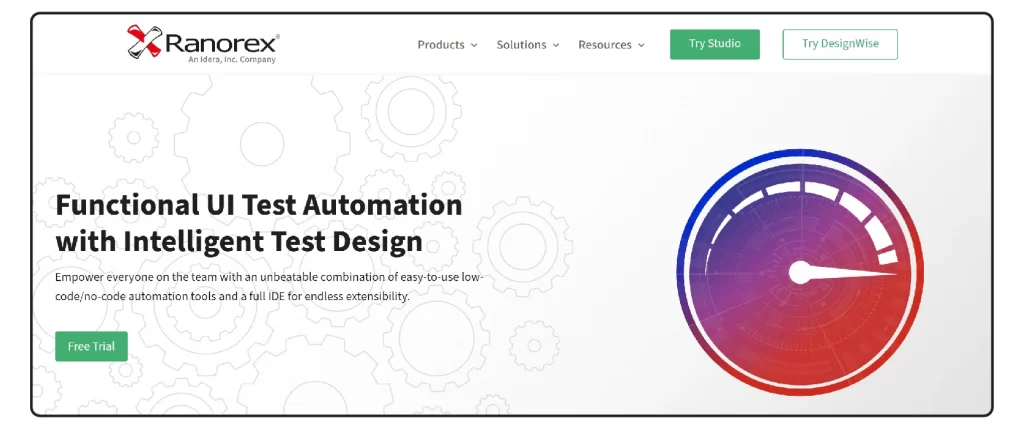
Ranorex Studio is a robust test automation DevOps tool designed to cater to a wide spectrum of GUI applications. Renowned for its reliability as a capture-and-replay tool, it simplifies and accelerates test automation. With Ranorex Studio, you gain the advantage of image-based automation, making it ideal for applications with dynamic or evolving elements.
It excels in cross-browser testing, ensuring that your applications perform flawlessly across various browsers. Moreover, Ranorex Studio extends its support to Linux and macOS testing environments. Every test run is accompanied by automatically generated reports, simplifying result tracking and monitoring, making it a powerful DevOps tool.
Key Features Of Ranorex Studio:
- Multi-Platform Compatibility: Ranorex Studio supports a wide range of platforms, ensuring comprehensive testing for various GUI applications.
- Code Reusability: Leverage Ranorex’s core automation framework, built in C# and VB.NET, within your development environment for code reuse and enhanced productivity.
- Image-Based Automation: With support for image-based automation, Ranorex Studio extends its capabilities to applications with dynamic or changing elements.
- Cross-Browser Testing: Ensure that your applications run seamlessly across all browsers with Ranorex Studio’s cross-browser testing capabilities.
- Linux and macOS Testing: Beyond the Windows Operating System, Ranorex Studio also supports testing on Linux and macOS environments.
- Automated Reporting: Ranorex Studio generates automatic reports for each test run, thereby simplifying the overall result tracking and monitoring.
6. Jenkins
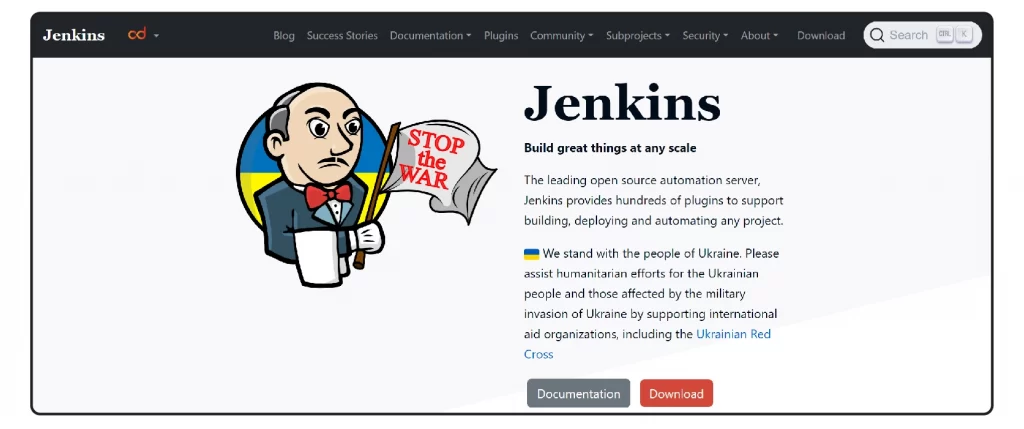
Jenkins, one of the popular DevOps tools, serves as the cornerstone of software development, finding its deployment at the heart of the core server where software magic unfolds. Its role typically extends, allowing for the scheduling and monitoring of repetitive tasks via Jenkins jobs.
However, the true gem in Jenkins’ crown is its Pipeline feature, a boon for developers seeking to automate code commits, run test cases, and fetch comprehensive test reports with finesse. Jenkins empowers development teams to iterate and deploy new code as quickly as possible, fostering a culture of continuous integration and delivery.
Recommended Reading
Key Features Of Jenkins:
- Versatile Automation: Jenkins serves as an open-source, server-based automation platform, empowering DevOps teams to automate a spectrum of tasks.
- Extensive Plugin Ecosystem: With over 1,800 plugins in its arsenal, Jenkins effortlessly integrates with a plethora of DevOps tools, including Docker, Puppet, and many more.
- Scalability and Adaptability: Jenkins is tailored to projects of all sizes and complexities, written in Java, and supplemented by a rich repository of add-ons and plug-ins.
- Cross-Platform Compatibility: Jenkins boasts ready-to-run Java-based programs compatible with OS X, Windows, Mac, and various UNIX operating systems.
- CI/CD Mastery: It’s not just a CI server; Jenkins serves as a comprehensive DevOps platform, facilitating seamless software deployment to servers.
- Multiple Interfaces: Jenkins offers flexibility through various interfaces, including Rest API, web-based GUI, and CLI, ensuring adaptability to diverse needs and preferences.
7. Ansible
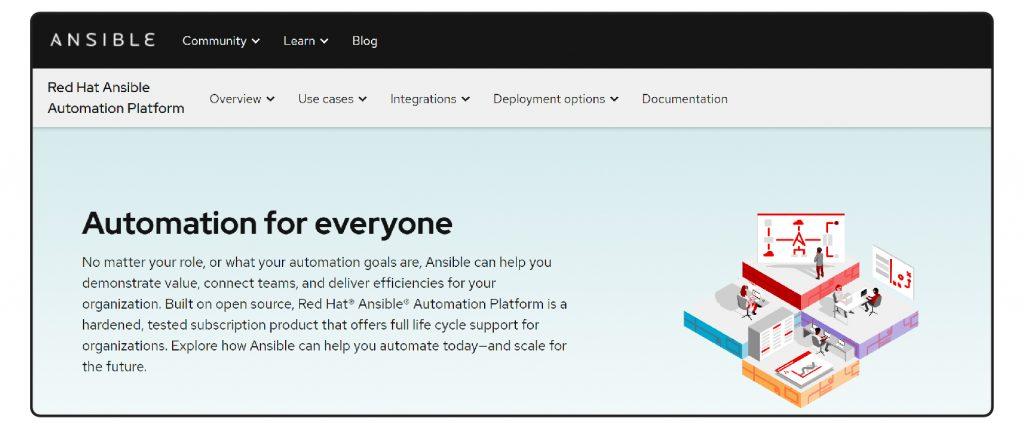
Ansible, the choice of discerning DevOps teams, reigns supreme in the field of automation, configuration management, and IT infrastructure orchestration. It seamlessly integrates and automates the entire spectrum of development processes, from testing and development to performance optimization and deployment.
In the outlook of the best DevOps services and the most popular DevOps tools, Ansible stands tall, accelerating productivity and simplifying a number of complex tasks. With Ansible, your team gains the power to streamline workflows, enhance collaboration, and achieve more in less time.
Key Features Of Ansible:
- Extensive Module Library: Ansible boasts a wealth of over 750 built-in modules, providing a comprehensive toolkit for automating, configuring, deploying, and planning IT infrastructure.
- Multi-Tier App Development: It excels in handling multi-tier application development, thereby simplifying the intricacies of complex applications.
- Simplicity and Efficiency: Ansible provides IT automation and configuration management without the need for additional daemons, servers, or databases, offering a streamlined solution.
- Diverse Module Selection: It offers an array of modules tailored for a number of different applications, enhancing flexibility and adaptability.
- Infrastructure-as-Code (IAC): Following the Infrastructure-as-Code (IAC) paradigm, Ansible simplifies configuration management with its straightforward YAML syntax.
- Resource-Friendly: Unlike resource-intensive competitors, Ansible offers a lighter footprint, ensuring optimal system performance while handling critical tasks in the background.
8. Chef
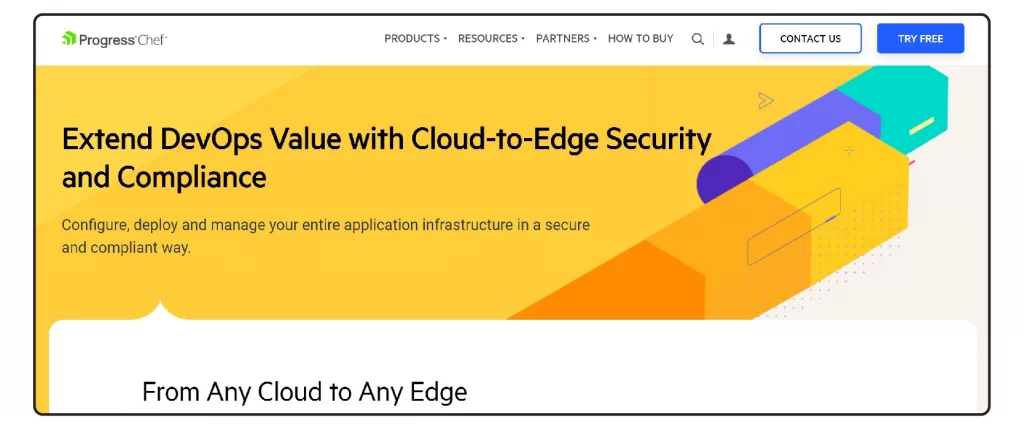
Chef, the stalwart of configuration management automation, emerges as the go-to tool for IT developers and operations managers alike. In the ever-evolving landscape of IT infrastructures, Chef plays a pivotal role in ensuring seamless utilization of applications and software. Its versatility shines through as it offers robust support for a broad spectrum of technologies.
As one of the best DevOps platforms or tools, Chef excels in configuring IT and system components with precision. Networks, servers, applications, and storage are seamlessly orchestrated to achieve optimal performance. With an active and fast-growing community, Chef empowers IT professionals to harness its scalability and flexibility.
Key Features Of Chef:
- Versatile Configuration Management: Chef provides a powerful configuration management automation tool that configures IT and system components, from networks to applications.
- Cloud Integration: It seamlessly integrates with a number of cloud-based platforms, facilitating agile application deployment.
- Collaborative Efficiency: Chef enhances collaboration among DevOps teams to a much greater extent, thereby promoting streamlined workflows.
- Infrastructure as Code (IAC): Chef embraces the concept of Infrastructure as Code, allowing IT professionals to define and manage infrastructure using code.
- Simple Declarative Language: Chef offers a simple and declarative language for describing infrastructure, enabling precise configuration specification.
- Scalability and Flexibility: Chef’s scalability and flexibility empower it to manage infrastructures of all sizes, from single servers to extensive networks.
9. Git
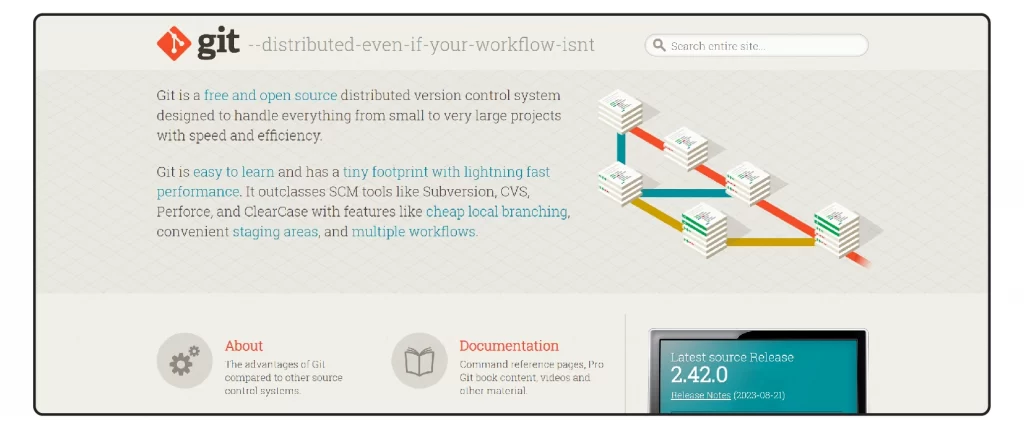
Git, the keystone of version control systems, emerges as one of the top DevOps tools, fostering efficient and collaborative software development. As a free and open-source distributed version control system, Git is designed to handle projects of all sizes, from modest endeavors to extensive, complex ventures.
Git’s importance within the DevOps cannot be overstated. It empowers teams to track the progression of application development while enabling rapid code iterations. Developers can swiftly share their updates through pull requests, facilitating timely collaboration. In the event of setbacks, Git’s instant rollback ensures that previous versions can be restored in seconds.
Key Features Of Git:
- Versatile Version Control: Git efficiently handles projects of varying sizes and complexities, making it suitable for both small-scale and large-scale endeavors.
- Direct IDE Integration: Git seamlessly integrates with popular Integrated Development Environments (IDEs) like Eclipse, VS Code, and IntelliJ, simplifying workflow management.
- Distributed SCM: As a distributed Source Code Management (SCM) tool, Git enables developers to manage source code versions effectively and track development progress.
- Rapid Release Cycles: Git accelerates the release cycle to a much greater extent, enabling timely and agile software development.
- Efficient Pull Requests: Developers can collaborate seamlessly by creating pull requests to share and review code updates.
- Instant Rollbacks: Git’s rollback capabilities allow for immediate restoration of previous versions in the event of errors or setbacks, ensuring project integrity and reliability.
10. New Relic
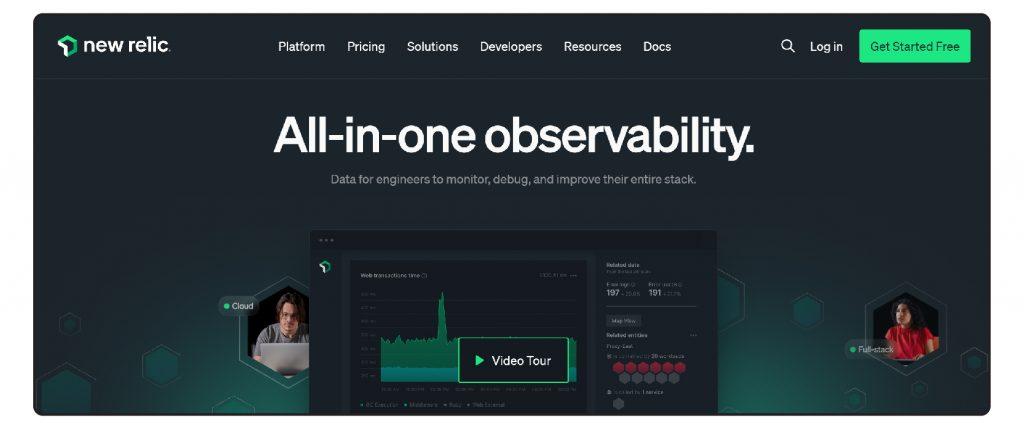
New Relic, a leading full-stack monitoring service, emerges as a beacon for engineers seeking to streamline their DevOps endeavors. This powerful tool serves as a centralized hub for collecting logs, metrics, events, and traces, consolidating critical data in one accessible location.
What sets New Relic apart is its real-time analytics, offering instantaneous insights into system performance and issues. New Relic’s extensive integrations, including AWS, Google Cloud, Microsoft Azure, Jenkins, CircleCI, Slack, and PagerDuty, creates seamless collaboration and streamline the entire DevOps workflow.
Key Features Of New Relic:
- Full-Stack Monitoring: New Relic offers comprehensive monitoring, collecting logs, metrics, events, and traces in one centralized platform.
- Real-Time Analytics: It provides real-time insights into system performance and issues, empowering proactive decision-making.
- Issue Correlation: New Relic excels in correlating issues across the entire stack, enhancing issue visualization and debugging efficiency.
- Performance Insights: Gain valuable insights into how your software is performing, identify areas of struggle, and discover optimization opportunities.
- Intuitive User Interface: The user-friendly interface simplifies data navigation and analysis, making complex information easily digestible.
- Extensive Integrations: New Relic integrates seamlessly with a range of apps, cloud platforms, CI/CD tools, and communication tools, promoting collaboration and workflow efficiency.
Summing Up
In this exploration of top DevOps tools, we discovered the tools that form the backbone of modern software development practices. From the inception of our quest in the introduction, we recognized the pivotal role that DevOps tools play in between development & operations teams.
In our quest to unveil the best DevOps tools of 2024, we have uncovered a tapestry of excellence, woven together by innovation, automation, and collaboration. As we journeyed through the individual chapters, we encountered a diverse ensemble of DevOps tools.
From Kubernetes to New Relic, each tool stood as a testament to innovation and efficiency. We unveiled their unique features, their ability to empower teams, and their capacity to catalyze productivity. In the grand tapestry of DevOps, these tools are not mere instruments; they are the brushstrokes that paint a vivid picture of excellence.
They enable organizations to scale, automate, and thrive in the fast-paced digital landscape. As we bid farewell to this blog, we leave you with the knowledge that these tools are your companions on the road to DevOps excellence, guiding your steps toward a future where efficiency and innovation reign supreme.

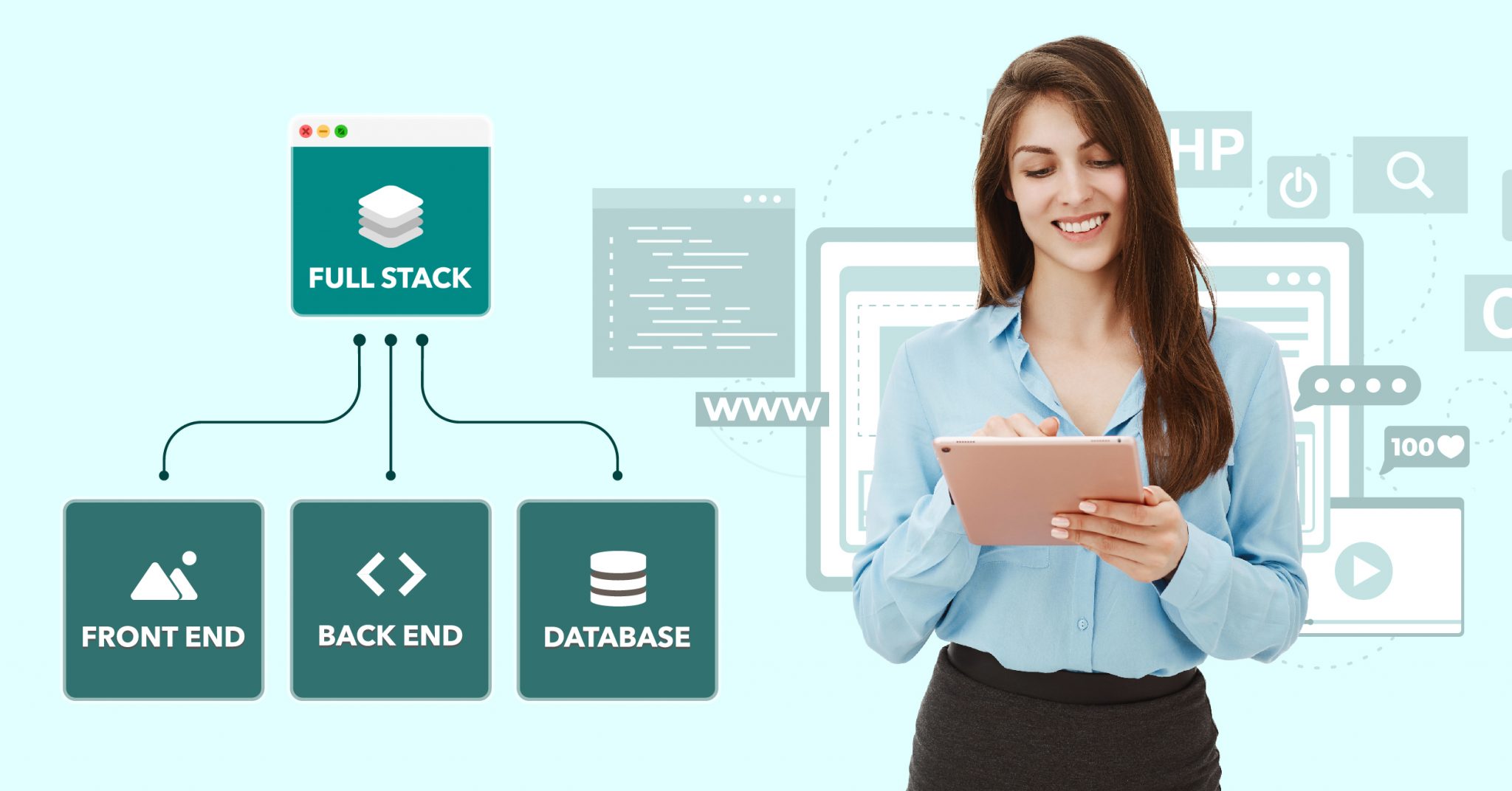
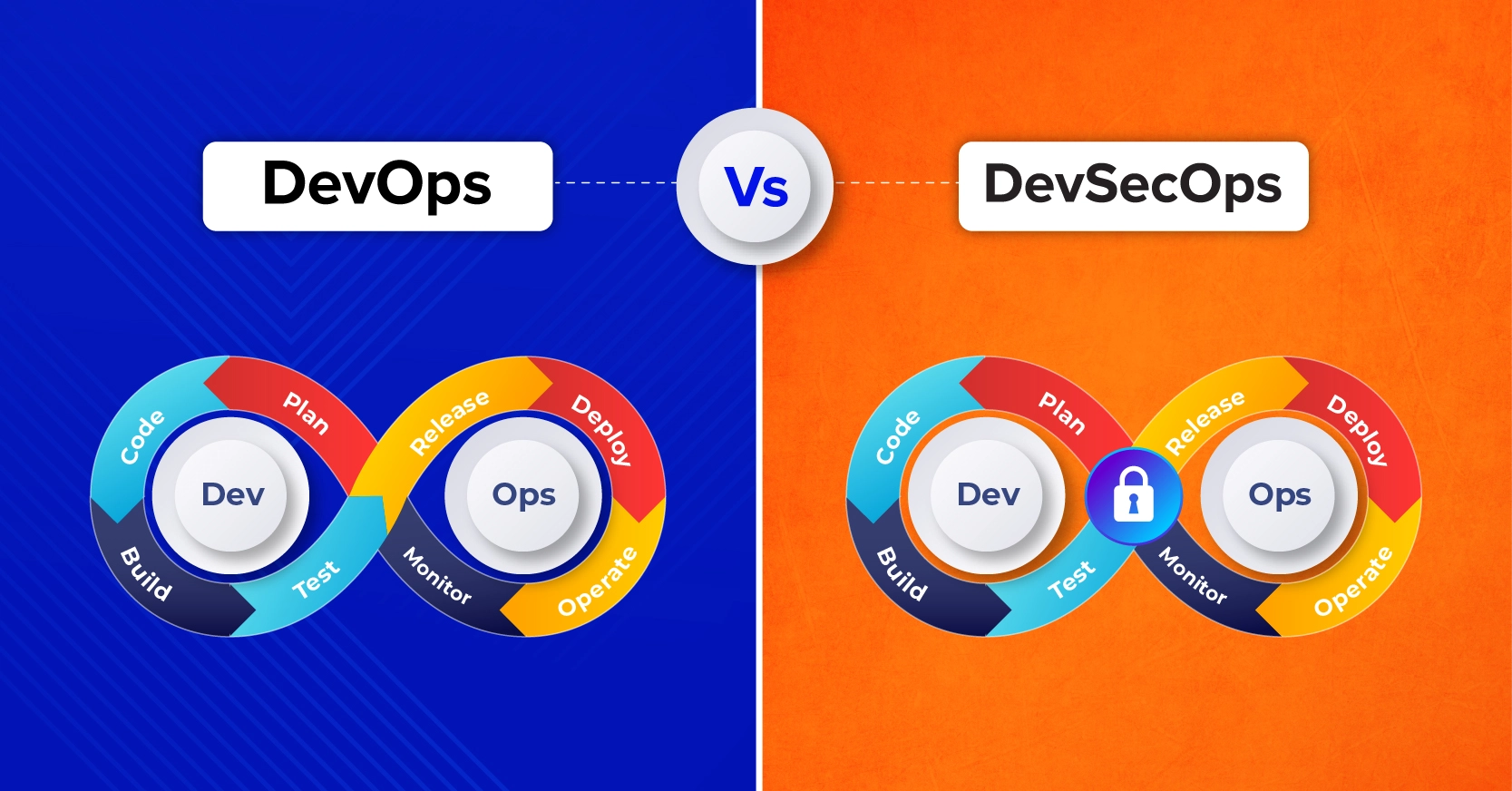
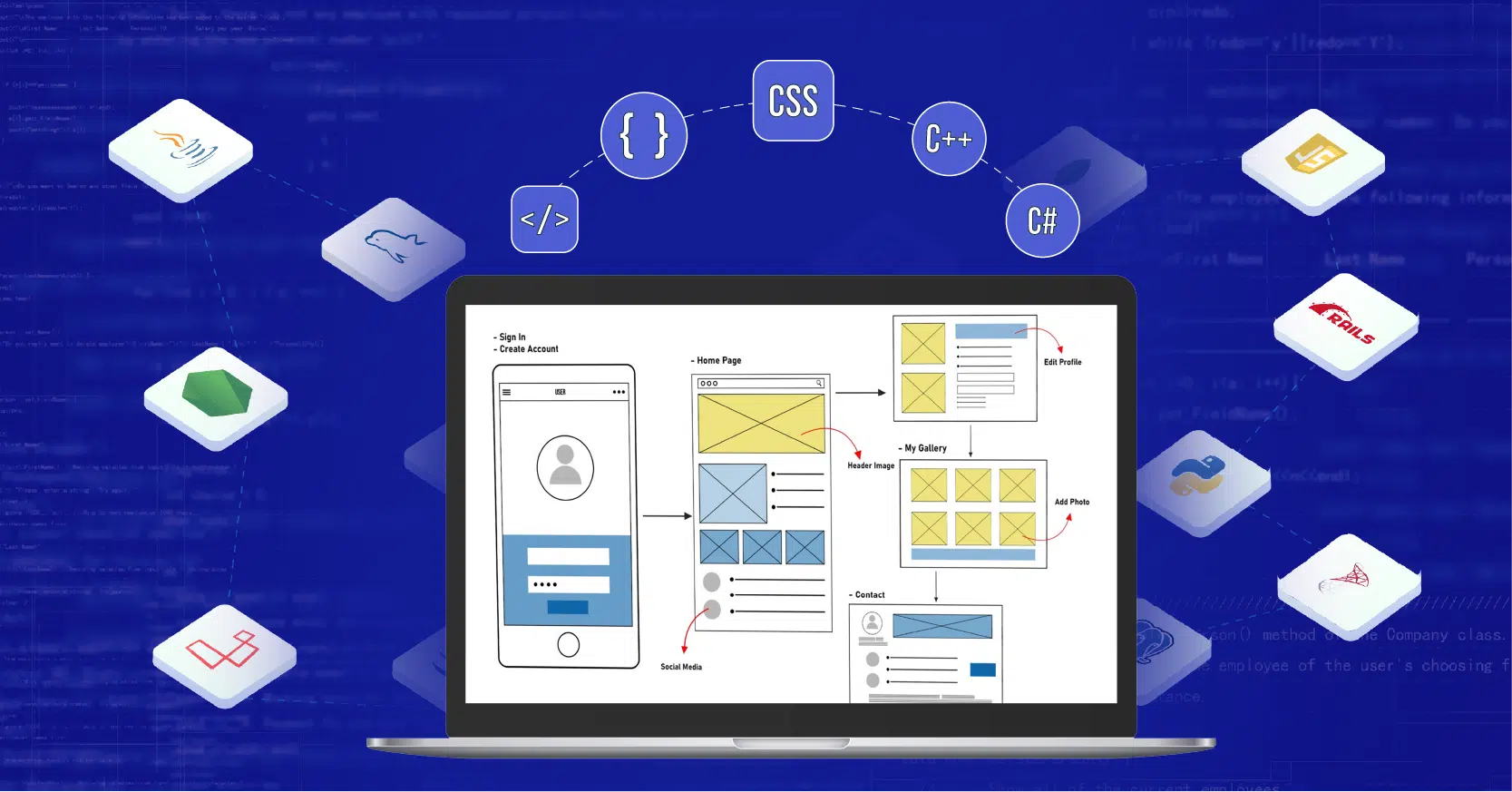


Thanks for sharing this list! I’ve been looking for top DevOps tools, and this blog has provided some great options to consider in 2023.
It’s great to see a comprehensive list like this. I’ll definitely check out these companies for popular devops tools. Any personal recommendations from the author?
Hi, This list of DevOps tools is spot-on for 2023! It’s great to have an up-to-date resource to help us stay ahead in the ever-evolving DevOps landscape.
Hi, I’ve been eagerly waiting for an updated list like this. Best DevOps platforms are continuously evolving, and knowing which ones are worth investing in for the year ahead is essential.
Thanks for this informative post! I’m just starting to dip my toes into DevOps, and this list will be my go-to resource for selecting the right tools to learn and master.
Hello, As an IT leader in my organization, I find this list incredibly valuable. It helps me make informed decisions about which DevOps tools to incorporate into our workflow in 2023.
Hi, Automation is a cornerstone of DevOps, and the tools mentioned here are essential for streamlining processes. Thanks for sharing this comprehensive list.
This list perfectly captures the evolving landscape of DevOps tools. The inclusion of emerging technologies like HashiCorp Vault and Terraform indicates the industry’s forward-looking approach. These tools are shaping the future of infrastructure provisioning and secrets management. Exciting times ahead for DevOps professionals embracing cutting-edge solutions!
This list is a fantastic guide for DevOps professionals seeking to optimize their workflows. The variety of tools mentioned caters to different aspects of the DevOps lifecycle, ensuring a well-rounded approach to development and operations. Exciting times ahead for those embracing these tools!
I’ve been eagerly awaiting an updated list of DevOps tools, and this compilation is spot-on! The inclusion of containerization and orchestration tools is essential in today’s containerized world. I’m thrilled to see the advancements that have been made in this space. Thanks for the thorough breakdown!
Excellent roundup! DevOps is all about efficiency and collaboration, and these tools seem to align perfectly with those goals. I’m particularly excited about the advancements in CI/CD tools – they play a crucial role in accelerating our development cycles. Thanks for keeping us updated!
Impressive lineup! It’s refreshing to see how DevOps tools continue to evolve to meet the demands of modern software development. The integration of AI and machine learning in some of these tools is particularly intriguing. Exciting times ahead for the DevOps community!
Wow, this list is a game-changer for 2024! Excited to see tools like Kubernetes and Docker maintaining their dominance. The DevOps landscape is evolving rapidly, and these platforms are essential for seamless integration and deployment. Looking forward to exploring the latest features and updates!
Thanks for sharing this valuable information! As a DevOps engineer, staying on top of the latest tools is crucial. I’ve used a few of these, and they’ve significantly improved our workflow. Can’t wait to explore the new additions – the DevOps landscape just keeps getting better!
Great list! I’ve been using several of these tools in my DevOps pipeline, and they’ve truly transformed the way we deploy and manage applications. Looking forward to exploring some new ones mentioned here, especially with the rapidly evolving tech landscape in 2024
What is the difference between Ansible & Chef in the DevOps platform list?
Ansible uses YAML and is was agentless, simplifying setup. Chef uses Ruby and it requires agents. Both are the key players among DevOps tools, each was excelling in the configuration management.
How do Ranorex Studio’s image-based automation features benefit testing?
Ranorex Studio is a part of the DevOps tools list which was excel with the image-based automation. It’s ideal for testing dynamic UIs & ensuring consistent test coverage in changing environments.
How does Docker differs from Kubernetes as a DevOps platforms?
Docker mainly focuses on the containerization, providing a consistent environment for applications. Kubernetes is a best DevOps platform that can manage multiple Docker containers, automating deployment & scaling across the clusters.
Are there any security considerations with using the Docker among DevOps tools?
Yes, always secure your Docker containers by scanning for vulnerabilities & using trustable images. As one of the best DevOps platforms, Docker includes features like to help, to manage these aspects.
Can Katalon be used for testing the mobile applications in DevOps?
Yes, Katalon is a flexible tool from the DevOps tools list shown. It will support for web, API, mobile & desktop testing making it a very best choice among DevOps platforms for testing.
Can I use Nagios for free for all of its features?
Nagios Core is free & open-source. It is a good choice in the DevOps tools list for monitoring. For more advanced features use Nagios XI, a top DevOps platform which is available as a paid option.